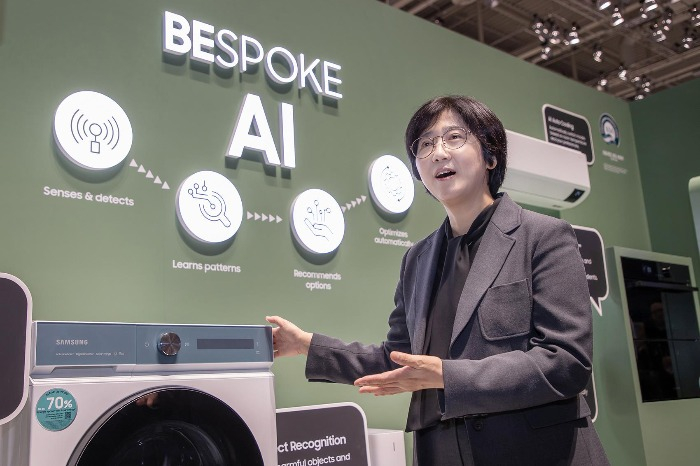Samsung to apply GenAI to all home appliances from 2024
The technology will allow more natural conversation using the company's voice-activated virtual assistant Bixby
By Sep 04, 2023 (Gmt+09:00)
LG Chem to sell water filter business to Glenwood PE for $692 million


Kyobo Life poised to buy Japan’s SBI Group-owned savings bank


KT&G eyes overseas M&A after rejecting activist fund's offer


StockX in merger talks with Naver’s online reseller Kream


Mirae Asset to be named Korea Post’s core real estate fund operator



BERLIN, GERMANY - Samsung Electronics Co. from next year will incorporate generative artificial intelligence (GenAI) into all home appliances and develop a chipset to accelerate AI data processing.
Samsung Electronics Vice President Yoo Mi-young, head of software development for the company’s home appliance division, on Saturday announced this at a news conference held at this year's IFA, Europe's largest trade show for home appliances, in Berlin, Germany.
"We're looking for solutions that apply GenAI and preparing application to three areas: voice, vision and display," she said. "AI mostly has on-device and cloud versions, but most are prepared as cloud versions."
Applying GenAI enables more natural conversations through Samsung Electronics’ AI voice-activated assistant Bixby. For example, to manage entry and exit of the Samsung Electronics refrigerator Family Hub, a user is limited to saying certain words like 'Put five apples in the refrigerator."
GenAI, however, allows a more natural sentence like "I bought five apples and three pears today, so put them in the refrigerator."
Because the company's GenAI is installed in products, its methods are different than those of ChatGPT, a leading GenAI interactive chatbot.
"Samsung Electronics is a product manufacturer, thus it'll use GenAI different from the ChatGPT camp’s solutions to improve the consumer experience," Vice President Yoo said.
The company is also developing a chipset for efficient processing of AI-related data.
"Consumers can get a bad experience if AI technology uses a lot of power," she added. "We’re developing a chipset capable of optimal performance by running AI 24 hours a day at super power of 0.1 watt or less."
Write to Ik-Hwan Kim at lovepen@hankyung.com
-
 ElectronicsCorning stepping stone for Samsung's global leap: Chairman Lee
ElectronicsCorning stepping stone for Samsung's global leap: Chairman LeeSep 01, 2023 (Gmt+09:00)
2 Min read -
 ElectronicsSamsung offers guide to greener, smarter life with SmartThings
ElectronicsSamsung offers guide to greener, smarter life with SmartThingsSep 01, 2023 (Gmt+09:00)
2 Min read -
 Korean chipmakersSamsung set to supply HBM3 to Nvidia, develops 32 Gb DDR5 chip
Korean chipmakersSamsung set to supply HBM3 to Nvidia, develops 32 Gb DDR5 chipSep 01, 2023 (Gmt+09:00)
4 Min read -
 ElectronicsSamsung Galaxy Z foldables set early sales record in Europe
ElectronicsSamsung Galaxy Z foldables set early sales record in EuropeSep 01, 2023 (Gmt+09:00)
1 Min read -
 ElectronicsSamsung’s connectivity vs. LG’s sustainability at IFA 2023
ElectronicsSamsung’s connectivity vs. LG’s sustainability at IFA 2023Aug 31, 2023 (Gmt+09:00)
4 Min read -
 ElectronicsSamsung, LG join hands to connect smart home devices
ElectronicsSamsung, LG join hands to connect smart home devicesAug 29, 2023 (Gmt+09:00)
2 Min read -
 Tech, Media & TelecomSamsung, LG Electronics gear up for IFA, IAA Mobility 2023
Tech, Media & TelecomSamsung, LG Electronics gear up for IFA, IAA Mobility 2023Aug 27, 2023 (Gmt+09:00)
2 Min read -



